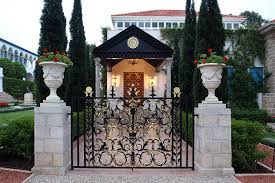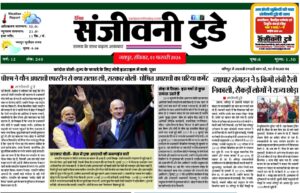Bahá’í Communities around the world are celebrating the First Day of Riḍván on 13 Jalál,182 B.E. i.e. on 20 April, 2025.
Festival of Riḍván, which marks the anniversary of Bahá’u’lláh’s declaration in 1863 that He was a New Messenger of God.
In the Kitáb-i-Aqdas, written during 1873, Bahá’u’lláh ordains Ridván as one of two “Most Great Festivals”, along with the Declaration of the Báb. He then specified the first, ninth, and twelfth days to be holy days; these days mark the days of Bahá’u’lláh’s arrival, the arrival of his family and their departure from the Ridván garden, respectively.
Today, in addition to electing local and national governing bodies, followers of Baha’u’llah often celebrate Ridvan with devotional meetings, artistic and musical presentations, or other types of gatherings, depending on the country.
The time that Bahá’u’lláh spent at the Garden of Ridván in April 1863, and the associated festival and celebration, has a very large significance for Bahá’ís. Bahá’u’lláh calls it one of two “Most Great Festivals” and describes the first day as “the Day of supreme felicity” and he then describes the Garden of Ridvan as “the Spot from which He shed upon the whole of creation the splendours of his Name, the All-Merciful”.
Furthermore, during Bahá’u’lláh’s first day in the garden, He made three further announcements: (1) abrogating religious war, which was permitted under certain conditions in Islam and the Bábí faith; (2) that there would not be another Manifestation of God for another 1000 years; and (3) that all the names of God were fully manifest in all things.
The first day of Riḍván is a holy day.
The first day of the Riḍván festival commemorates the day Bahá’u’lláh’ entered the garden of Riḍván and declared that He was the Promised One of all the religions.
The Festival of Riḍván is a 12-day festival of the Baháʼí Faith celebrated every year and starting on either April 20 or April 21- depending on the March equinox – and will be marked this year from April 20 to May 1.
Riḍván, which means paradise; is a twelve-day festival in the Bahá’í Faith commemorating Bahá’u’lláh’s declaration that He was a Manifestation of God. In the Bahá’í calendar, it begins at sunset on the 13th of Jalál, which translates to the 20th or 21 April, depending on the date of the March equinox (exactly one month on the Gregorian calendar after the equinox).
The Najibiyyih Garden, as it was first known, was named for Muhammad Najib Pasha, the wāli (governor) of Baghdad from 1842 to 1847, who built the garden and an attached palace in what was originally an agricultural area outside the city. Although Najib Pasha died in May 1851, the garden was presumably in the hands of his heirs when it was used by Baháʼu’lláh, between April through May, 1863.
Despite its importance to the Baháʼí community, the garden was never owned by the Baháʼís. It was purchased by the government in 1870, and was used as a guest house for Nasruddin-Shah—who was responsible for Baháʼu’lláh’s imprisonment and exile—when he visited Iraq in 1870. The park was further developed during the governorship of Midhat Pasha (1869–1872), who leveled the road leading to the garden and built another road, approximately 400–500 meters in length. The garden was cleared during the early twentieth century, to make way for the Royal Hospital. Baghdad Medical City, a large complex of teaching hospitals, now stands in its place.

Baháʼu’lláh entered the Najibiyyih Garden on April 21, 1863, in order to receive visitors and allow His family to prepare for His upcoming trip to Constantinople. He crossed the Tigris in a small boat accompanied by His sons ʻAbdu’l-Bahá, Mírzá Mihdí and Mírzá Muhammad ʻAlí, his secretary Mirza Aqa Jan and some others. After their arrival in the garden, Baháʼu’lláh announced His Mission and station for the first time to a small group of family and his followers. For the next eleven days Baháʼu’lláh received visitors including the governor of Baghdad. Baháʼu’lláh’s family was not able to join Him until April 30, 1863, the ninth day, since the river had risen and made travel to the garden difficult. On the twelfth day of their stay in the garden, Baháʼu’lláh and His family left the garden and started on their travel to Constantinople.
It was Baháʼu’lláh who gave the garden the name of Ridván (“paradise”) during His stay, and the name was thereafter applied to the twelve-day Festival of Ridván—known as the “King of Festivals”—celebrated annually by Baháʼís between 21 April and 2 May. Certain days of this festival are tied to major events that took place during the period of Baháʼu’lláh’s stay in the garden: the first day celebrates His arrival in the garden; the ninth day, the arrival of His family; and the twelfth day, His caravan’s departure towards Constantinople.
These three days are major Baháʼí holy days, on which work must be suspended.
Bahá’u’lláh called Riḍván the “King of Festivals” and the “Festival of God,” among other names.
The history of Ridván festival begins during the afternoon of April 21, 1863 (around 3:00 p.m.), when Bahá’u’lláh arrived in the Najíbíyyih Garden,subsequently designated as the Garden of Ridván.
Ridván marks the inception of the Bahá’í Faith as a distinct religion.Through the previous decade (1853–1863), Bahá’u’lláh had concealed His Mission. This period of “messianic secrecy” has been referred to as the “Days of Concealment”, although Bahá’u’lláh’s writings in Baghdad during this period were rife with hints about His Prophetic Mission, especially in His pre-eminent doctrinal text, the Book of Certitude (Kitáb-i-Íqán), which was revealed in two days and two nights in January 1861. Beyond the basic revelation that He was “He Whom God will make manifest,” Every year, on the first day of Ridván, Bahá’ís in thousands of localities around the globe vote for their local governing councils. Also during the festival, national conventions are held in some countries and territories, during which delegates vote for the national governing bodies of the Bahá’í Faith.
Several years later (ca. 1867–1870), Bahá’u’lláh sent open epistles (called Tablets) to a select group of the world’s most powerful potentates and clerics, proclaiming Himself to be the “Promised One” foretold by the
Prophets of all past religions. In these Tablets, together with general Tablets addressed to kings and religious leaders collectively, Bahá’u’lláh stated that He was, the long-awaited “World Reformer” who came to unify the world—a transformation that would, in the course of time, come about through the power of His universal principles and laws adapted to the needs of this day and age.
This Most Great Festival is historically very unique. It marks Baha’u’llah’s time in the garden of Ridvan outside of Baghdad in 1863. There, for the first time, He publicly declared His station as a Manifestation of God.
It is the holiest Bahá’í festival, and is also referred to as the “Most Great Festival” and the “King of Festivals”.
Ridván messages
Annually, during Ridván, the Universal House of Justice sends a ‘Ridván message’ to the worldwide Bahá’í community, which generally looks back on the previous year, and provides further guidance for the coming year.
Ninth Day of Riḍván falls on 2 Jamál, 182 B.E. i.e. on 28 April, 2025.
Twelfth Day of Riḍván falls on 5 Jamál, 182 B.E. i.e. on 1 May, 2025.
The first, ninth, and twelfth days are regarded as the holy days of the festival. For Baha’i adherents, on these days, all work should be suspended.
Compiled by:-
Jaya Raju Thota
Greater Visakhapatnam
Andhra Pradesh,
India









